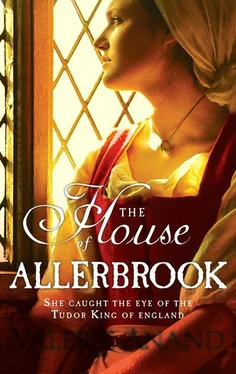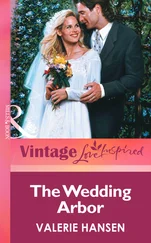“Yes. That christening party fits in,” Eleanor said.
“So I told Shearer I believed her and not him and aimed a punch at him. He hit back and we were fighting in the kitchen when his wife came charging in—and I do mean charging.” For a moment, despite the unhappy situation, Francis grinned. “In she came, like a whole squadron of cavalry. I’ve been a-listening! So you’ve been at it again, have you, you lecherous hound! That’s what she said. Then she grabbed a frying pan off a hook on the wall and landed him a beauty on top of his head. He sat down on the floor looking dazed and I said to her, sorry, but the two of them had to pack up and be off the farm double-quick. I want new, decent tenants. She cried and he sat there rubbing his head and cursing but I wouldn’t give in. They’ve kin in Barnstaple and that’s where they’re going. The stock’s theirs. I settled to sell the animals and send them the money. I never want to see or hear of them again after that. I gathered from a few more remarks his wife threw at him that he’s left other by-blows scattered around.”
“Lively goings-on,” remarked Ralph. “But as for finding the girl a husband…”
“Got an unmarried tenant that might do?” Sir William enquired.
“Harry Hudd’s a widower,” said Eleanor. “He rents Rixons, down the hill from here. He’s looking for another wife. Only…”
“I know Harry,” Francis said. “He’s a rough type but he’s respectable. As his landlord, I could order him—or pay him—but he wouldn’t like the kind of talk there’d be if he married a girl in Sybil’s condition. There’d be folk saying it must be his, for one thing, and for another, he’s not the sort to want to rear another man’s child. No, I can’t offer Sybil to Hudd. It’s not fair on him.”
Neither of the Lanyons had so far commented, though they had gone on whispering to each other. Owen Lanyon now spoke up.
“I’ve a suggestion. Not about marriage—I don’t know anyone suitable and I’m not offering Idwal here.” Idwal, who had been looking worried, passed a hand over his fiery hair in a gesture of relief. “But we live at Lynmouth, a good way off—nigh on twelve miles if you’re a crow and farther on a horse. No one there’ll know who Sybil is. She can come to us.”
“Are you sure? That’s a very generous offer,” Francis said.
“She’s old enough to have been married.” Katherine, straight of back and stout of midriff, though not as massively so as Mary Stone, nodded in agreement. “We could say that she’s a distant kinswoman, which she is, and that she’s a young widow. That smallpox last year took a lot of lives.”
“We’ll not make a pet of her—don’t think that,” Owen said. “What she’s done was wrong and she has to realize it. But we won’t ill-treat her either, or her baby. They’ll have a home with us. Katherine can always use another pair of hands about the house. What about it?”
Jane cleared her throat and they all turned. “You want to say something, Jane?” said Francis.
“Need Sybil go away forever?” Jane asked. “If…if Master and Mistress Lanyon could look after her until the baby’s born, and if, maybe, we can find someone who’d like to foster the child, couldn’t Sybil come back then? She’s my sister. I’ll miss her so much and she’ll feel so unhappy, cast out from her home.”
“You’d have missed her if she went to court, and as for being unhappy, she’s brought that on herself,” said Francis. “No, Jane. Sybil must leave this house, and for good. Your affection for your sister is creditable, of course, but I shall not change my mind. What our parents would have said to her behaviour, I shudder to think.”
“We have an answer now, at least,” said Eleanor. “We are grateful, Master Lanyon.” Looking around, she saw Peggy hovering restively at the door to the kitchen. “I think,” she said, “that the feast is ready.”
* * *
Dinner had been served at half past two. It was not as prolonged as it would have been in more cheerful circumstances. The meal was over inside two hours. However, the March darkness still fell quite early and most of the guests were to stay overnight and leave in the morning. Only the Stones went home that evening, since they had to go only a mile down the combe to Clicket. After they had gone, Francis discovered that Jane had slipped out of the house. He found her leaning on the gate of the field where the Sweetwaters grazed their horses.
“So here you are. I was afraid you’d gone roaming up to the ridge, and it’s too late in the day for that.”
“I just wanted to be by myself for a while,” Jane said. Against the background of tussocky grass and grazing horses and soaring moorland, her damask finery was incongruous.
The narrow path from the rear of the house led past the small mews where Francis kept his two hawks and on past the field to join the track that ran up the side of the combe to the ridge. There the Allerbrook River had its springs in a spongy bog, and there were ring ouzels and curlews, and occasionally an adder slipping away through the grass from the sound of hooves or footfalls. Sybil, who was lazy, never walked up to the ridge, but Jane sometimes did, liking the solitude.
“I wanted to tell you,” said Francis, “that when the Lanyons leave tomorrow, taking Sybil with them, I will allow you to say goodbye to her if you wish.”
“I do wish!” said Jane. She turned to him. “Of course I want to say goodbye to her. I can’t bear it that you’re sending her away forever!”
“If she had gone to court and then married someone from the other side of the country, you might never have seen her again. You may make your farewells, but once Sybil goes, she is out of our lives for good. Remember that! Now, come indoors. After supper I want you to play your lute for us.”
“Francis…”
“Yes, what is it?”
“Today someone suggested I might go to court instead. I don’t want to, one little bit.”
“Listen to me, Jane. You and Sybil were born into a good family, into a comfortable life in a house where you have had fine clothes and no hard work—every indulgence. Do you think you can have all that and not give something back? Sybil has thrown away her chance to be of use to her family. I trust you don’t want to throw yours away, as well!” He laughed. “You’re still very young. When you’re older, you’ll feel differently, I promise. If Palmer’s cousin finds a post for you later on, believe me, you’ll be delighted with it.”
Jane was silent, still leaning on the gate. The sun had come out as evening approached, and as it set, it shed a softness over everything, so that the green meadow was tinged with gold and faintly dappled with the shadows of the tussocks.
There were things she knew Francis would not understand. Their father would have done, but Johnny Sweetwater had died two years ago, struck down by a fever after getting soaked and frozen while bringing sheep in to safety from an unexpected snowstorm. Her mother had gone two years earlier, from some internal malady that no physician could explain. Since then, Jane and Sybil had been in the care of their elder brother and his wife, and no one could say that Francis or Eleanor had been anything but conscientious and kind, but they were not like Father.
He had loved Allerbrook, loved the racing waters in the combe, and the moor with its varying moods, and the yearly cycle of the farm. And so did Jane. She did not want to go away to court, and her father would have known. He would have been less harsh with Sybil, too. Angry, yes, but perhaps —not so unforgiving. There would have been hope for Sybil in the end.
Francis had a hardness in him which their father had lacked. If he wanted her to go to court, then go she would. And if she cried for Sybil, she had better do it secretly, in bed. “I’ll be glad to play my lute after supper,” she said, and followed Francis obediently indoors.
Читать дальше












